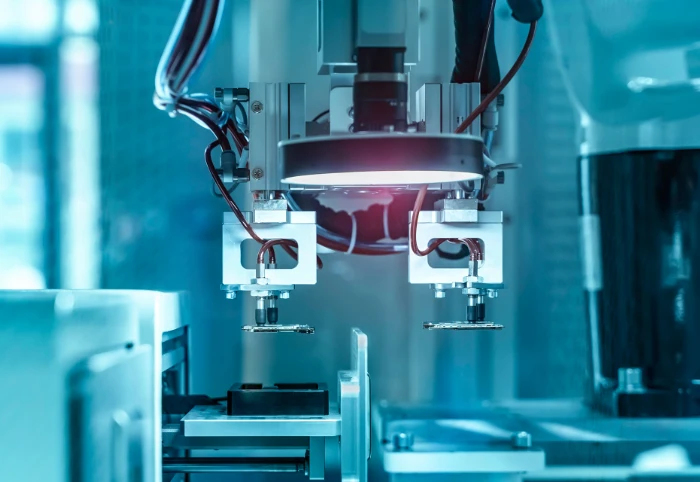產品資訊
 1-T 80C51 Central Processing Unit
1-T 80C51 Central Processing Unit MG82F6D17 with 16K Bytes flash ROM
MG82F6D17 with 16K Bytes flash ROM
 ISP memory zone could be optioned as 0.5KB/1.0KB~7.5KB
ISP memory zone could be optioned as 0.5KB/1.0KB~7.5KB Flexible IAP size by software configured
Flexible IAP size by software configured Code protection for flash memory access
Code protection for flash memory access Flash write/erase cycle: 20,000
Flash write/erase cycle: 20,000  Flash data retention: 100 years at 25℃
Flash data retention: 100 years at 25℃ Default MG82F6D17 Flash space mapping
Default MG82F6D17 Flash space mapping
AP Flash default mapping 13.5KB 0000h~35FFh IAP Flash default mapping 1.0KB 3600h~39FFh ISP Flash default mapping 1.5KB 3A00h~3FFFh, ISP Boot code
 Data RAM : 1K Bytes
Data RAM : 1K Bytes
 On-chip 256 bytes scratch-pad RAM
On-chip 256 bytes scratch-pad RAM 768 bytes expanded RAM (XRAM)
768 bytes expanded RAM (XRAM) Support page select on XRAM access
Support page select on XRAM access
 Dual data pointer
Dual data pointer Provide one channel DMA engine
Provide one channel DMA engine
 P2P, M2P, P2M
P2P, M2P, P2M Memory target: XRAM
Memory target: XRAM Peripheral target: UART0, UART1, SPI, TWI0/I2C0, ADC12 & CRC16
Peripheral target: UART0, UART1, SPI, TWI0/I2C0, ADC12 & CRC16 Timer 5 and Timer 6 are used for DMA, but it also can be traded as independent timer when DMA not in use
Timer 5 and Timer 6 are used for DMA, but it also can be traded as independent timer when DMA not in use
 Interrupt controller
Interrupt controller
 16 sources, four-level-priority interrupt capability
16 sources, four-level-priority interrupt capability Three external interrupt inputs, nINT0, nINT1 and nINT2, with glitch filter
Three external interrupt inputs, nINT0, nINT1 and nINT2, with glitch filter All external interrupts support High/Low level or Rising/Falling edge trigger
All external interrupts support High/Low level or Rising/Falling edge trigger
 Total 9/11 timers in MG82F6D17
Total 9/11 timers in MG82F6D17
 RTC Timer and WDT Timer
RTC Timer and WDT Timer Timer 0, Timer 1, Timer 2 and Timer 3
Timer 0, Timer 1, Timer 2 and Timer 3 PCA0, Program Counter Array 0
PCA0, Program Counter Array 0 S0 BRG and S1 BRG
S0 BRG and S1 BRG If Timer 2/3 in split mode, then total 11 timers
If Timer 2/3 in split mode, then total 11 timers
 Four 16-bit timer/counters, Timer 0, Timer 1, Timer 2 and Timer 3
Four 16-bit timer/counters, Timer 0, Timer 1, Timer 2 and Timer 3
 X12 mode and timer clock output function
X12 mode and timer clock output function Synchronous Run-Enable on all timer (same function on Stop and Reload)
Synchronous Run-Enable on all timer (same function on Stop and Reload) New 5 operating modes in Timer 2/3 with 8 clock sources and 8 capture sources
New 5 operating modes in Timer 2/3 with 8 clock sources and 8 capture sources Timer 2/3 can be split to two 8-bit timers
Timer 2/3 can be split to two 8-bit timers Clock Count Output (CCO) on T2CKO and T3CKO
Clock Count Output (CCO) on T2CKO and T3CKO All timers support PWM mode
All timers support PWM mode
 One Programmable 16-bit counter/timer Arrays (PCA0) with 8 Compare/PWM modules
One Programmable 16-bit counter/timer Arrays (PCA0) with 8 Compare/PWM modules
 PCA0 has 6 CCP (Capture/Compare/PWM) modules and 2 CP (Compare/PWM) modules
PCA0 has 6 CCP (Capture/Compare/PWM) modules and 2 CP (Compare/PWM) modules Reloadable 16-bit base counter to support variable length PWM
Reloadable 16-bit base counter to support variable length PWM Up to 144MHz clock source from on-chip CKM
Up to 144MHz clock source from on-chip CKM Capture mode, 16-bit software timer mode and High speed output mode
Capture mode, 16-bit software timer mode and High speed output mode Buffered capture mode to monitor narrow pulse input
Buffered capture mode to monitor narrow pulse input Variable 8/10/12/16-bit PWM mode, the PCA can be configured to:
Variable 8/10/12/16-bit PWM mode, the PCA can be configured to:
Up to 8 channels un-buffered 10/12/16-bit PWM, or Up to 8 channels buffered 2~8-bit PWM, or Up to 4 channels buffered 9~16-bit PWM  PCA0 PWM module 0~5 with dead-time control, break control and central-aligned option
PCA0 PWM module 0~5 with dead-time control, break control and central-aligned option
 8 Inputs Keypad Interrupt
8 Inputs Keypad Interrupt 12-Bit Single-ended ADC
12-Bit Single-ended ADC
 Programmable throughput up to 800K sps
Programmable throughput up to 800K sps 8 channel external inputs and one channel internal input (IVR/1.4V)
8 channel external inputs and one channel internal input (IVR/1.4V) Support window detect function on ADC result
Support window detect function on ADC result Support channel scan mode
Support channel scan mode
 Enhanced UART (S0)
Enhanced UART (S0)
 Framing Error Detection
Framing Error Detection Automatic Address Recognition
Automatic Address Recognition Max. UART baud rate up to 3.6864MHz/ 6MHz
Max. UART baud rate up to 3.6864MHz/ 6MHz Support SPI Master in Mode 4, up to 12MHz on SPICLK
Support SPI Master in Mode 4, up to 12MHz on SPICLK Built-in baud rate generator (S0BRG) to support TX or RX on different baud rate
Built-in baud rate generator (S0BRG) to support TX or RX on different baud rate Support LIN bus protocol with auto baud rate detection in mode 5
Support LIN bus protocol with auto baud rate detection in mode 5 S0BRG in timer mode cascaded with Timer 0/1 to be a 16/24-bit timer/counter
S0BRG in timer mode cascaded with Timer 0/1 to be a 16/24-bit timer/counter
 Secondary UART (S1)
Secondary UART (S1)
 Dedicated Baud Rate Generator (S1BRG) shares to S0 or set as an 8-bit timer
Dedicated Baud Rate Generator (S1BRG) shares to S0 or set as an 8-bit timer Max. UART baud rate up to 1.8432/3.0MHz
Max. UART baud rate up to 1.8432/3.0MHz Support SPI Master in Mode 4, up to 12MHz on SPICLK
Support SPI Master in Mode 4, up to 12MHz on SPICLK S1BRG in timer mode cascaded with Timer 0/1 to be a 16/24-bit timer/counter
S1BRG in timer mode cascaded with Timer 0/1 to be a 16/24-bit timer/counter
 One Master/Slave SPI serial interface
One Master/Slave SPI serial interface
 Max. 24MHz SPICLK on SPI master
Max. 24MHz SPICLK on SPI master Max 12MHz on SPI slave
Max 12MHz on SPI slave 8 bits data transfer
8 bits data transfer Up to 3 SPI masters including S0/S1 in mode 4
Up to 3 SPI masters including S0/S1 in mode 4 Support daisy-chain function in SPI slave mode
Support daisy-chain function in SPI slave mode
 Two Master/Slave two wire serial interfaces: TWI0/I2C0 and STWI (SI2C)
Two Master/Slave two wire serial interfaces: TWI0/I2C0 and STWI (SI2C)
 One Master/Slave hardware engine: TWI0/I2C0
One Master/Slave hardware engine: TWI0/I2C0 Max. 1MHz on TWI0/ I2C0 master mode and Max. 400KHz on TWI0 slave mode
Max. 1MHz on TWI0/ I2C0 master mode and Max. 400KHz on TWI0 slave mode One software TWI/ I2C, STWI/ SI2C, Start/Stop serial interface detection (SID)
One software TWI/ I2C, STWI/ SI2C, Start/Stop serial interface detection (SID)
 Programmable Watchdog Timer (WDT), clock sourced from ILRCO or SYSCLK
Programmable Watchdog Timer (WDT), clock sourced from ILRCO or SYSCLK
 One time enabled by CPU or power-on
One time enabled by CPU or power-on Interrupt CPU or Reset CPU on WDT overflow
Interrupt CPU or Reset CPU on WDT overflow Support WDT function in power down mode (watch mode) for auto-wakeup function
Support WDT function in power down mode (watch mode) for auto-wakeup function
 Real-Time-Clock (RTC) module, clock sourced from ILRCO, WDTPS, WDTOF, SYSCLK or SYSCLK/12
Real-Time-Clock (RTC) module, clock sourced from ILRCO, WDTPS, WDTOF, SYSCLK or SYSCLK/12
 Programmable interrupt period from mini-second wakeup to minute wakeup
Programmable interrupt period from mini-second wakeup to minute wakeup 21-bit length system timer
21-bit length system timer
 Beeper function
Beeper function General purpose logic (GPL/CRC)
General purpose logic (GPL/CRC)
 Bit order reversed function
Bit order reversed function 16-bit CRC engine (CCITT-16 polynomial)
16-bit CRC engine (CCITT-16 polynomial) Support automatic CRC of flash content
Support automatic CRC of flash content Programmable initial seed function of CRC
Programmable initial seed function of CRC
 On-Chip-Debug interface (OCD)
On-Chip-Debug interface (OCD)
 MG82F6D17AS8 SOP8 not support OCD
MG82F6D17AS8 SOP8 not support OCD
 Maximum 17 GPIOs in 20-pin package
Maximum 17 GPIOs in 20-pin package
 P3 can be configured to quasi-bidirectional, push-pull output, open-drain output and input only
P3 can be configured to quasi-bidirectional, push-pull output, open-drain output and input only P0, P1, P2, P4 and P6 can be configured to open-drain output or push-pull output
P0, P1, P2, P4 and P6 can be configured to open-drain output or push-pull output P4.7 shared with RST
P4.7 shared with RST Programmable GPIO driving strength and driving speed
Programmable GPIO driving strength and driving speed On chip pull-up enable on each pin
On chip pull-up enable on each pin
 Clock Sources
Clock Sources
 Internal 12MHz/11.059MHz oscillator (IHRCO): factory calibrated to ±1%, typical
Internal 12MHz/11.059MHz oscillator (IHRCO): factory calibrated to ±1%, typical Internal Low power 32KHz RC Oscillator (ILRCO)
Internal Low power 32KHz RC Oscillator (ILRCO) External clock input (ECKI) on P6.0, up to 25MHz
External clock input (ECKI) on P6.0, up to 25MHz Internal RC Oscillator output on P6.0
Internal RC Oscillator output on P6.0 On-chip Clock Multiplier (CKM) to provide high speed clock source (144MHz)
On-chip Clock Multiplier (CKM) to provide high speed clock source (144MHz)
 Two Brown-Out Detectors
Two Brown-Out Detectors
 BOD0: detect 1.7V
BOD0: detect 1.7V BOD1: selected detection level on 4.2V/3.7V/2.4V/2.0V
BOD1: selected detection level on 4.2V/3.7V/2.4V/2.0V Interrupt CPU or reset CPU
Interrupt CPU or reset CPU Wake up CPU in Power-Down mode (BOD1)
Wake up CPU in Power-Down mode (BOD1)
 Multiple power control modes: idle mode, power-down mode, slow mode, sub-clock mode, RTC mode, watch mode and monitor mode.
Multiple power control modes: idle mode, power-down mode, slow mode, sub-clock mode, RTC mode, watch mode and monitor mode.
 All interrupts can wake up IDLE mode
All interrupts can wake up IDLE mode 12(13) sources with 16 pins to wake up Power-Down mode
12(13) sources with 16 pins to wake up Power-Down mode Slow mode and sub-clock mode support low speed MCU operation
Slow mode and sub-clock mode support low speed MCU operation RTC mode supports RTC to resume CPU in power down
RTC mode supports RTC to resume CPU in power down Watch mode supports WDT to resume CPU in power down
Watch mode supports WDT to resume CPU in power down Monitor mode supports BOD1 to resume CPU in power down
Monitor mode supports BOD1 to resume CPU in power down
 Operating voltage range: 1.8V – 5.5V
Operating voltage range: 1.8V – 5.5V
 Minimum 1.8V requirement in flash write operation (ISP/IAP/ICP)
Minimum 1.8V requirement in flash write operation (ISP/IAP/ICP)
 Operating frequency range: 32MHz(max)
Operating frequency range: 32MHz(max)
 External clock input mode, 0 – 12MHz @ 2.0V – 5.5V, 0 – 25MHz @ 2.4V – 5.5V
External clock input mode, 0 – 12MHz @ 2.0V – 5.5V, 0 – 25MHz @ 2.4V – 5.5V CPU up to 12MHz @ 1.8V – 5.5V and up to 25MHz @ 2.2V – 5.5V
CPU up to 12MHz @ 1.8V – 5.5V and up to 25MHz @ 2.2V – 5.5V CPU up to 32MHz @ 2.7V – 5.5V with on-chip CKM
CPU up to 32MHz @ 2.7V – 5.5V with on-chip CKM
 Operating Temperature:
Operating Temperature:
 Industrial (-40℃ to +105℃)*
Industrial (-40℃ to +105℃)*
 Package Types:
Package Types:
 SOP8(150 mil): MG82F6D17AS8 (16K)
SOP8(150 mil): MG82F6D17AS8 (16K) SSOP20 (150 mil): MG82F6D17AL20 (16K)
SSOP20 (150 mil): MG82F6D17AL20 (16K) TSSOP20 (173 mil): MG82F6D17AT20 (16K)
TSSOP20 (173 mil): MG82F6D17AT20 (16K) QFN20 (3 x 3 x 0.55 mm): MG82F6D17AZ20 (16K)
QFN20 (3 x 3 x 0.55 mm): MG82F6D17AZ20 (16K)
- Note*: Tested by sampling.




